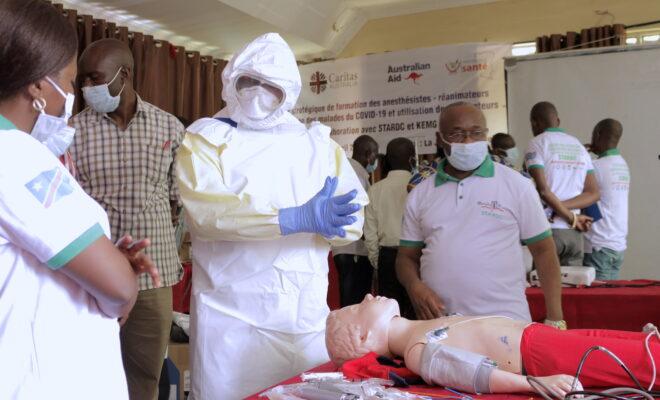
Debating Ideas is a new section that aims to reflect the values and editorial ethos of the African Arguments book series, publishing engaged, often radical, scholarship, original and activist writing from within the African continent and beyond. It will offer debates and engagements, contexts and controversies, and reviews and responses flowing from the African Arguments books.
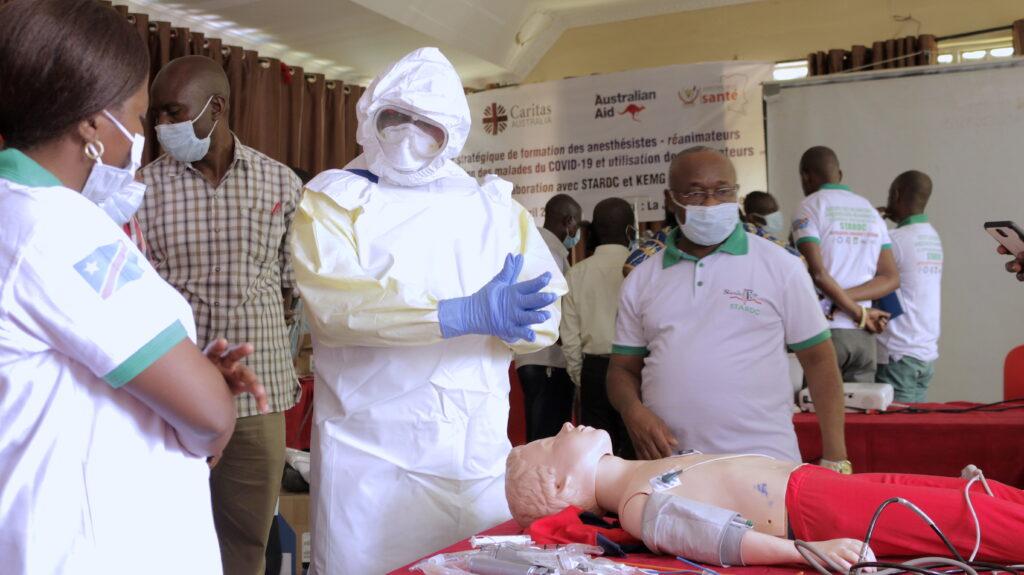
COVID-19 emergency response training center DRC
In February 2020, we were still following the case numbers of the Ebola Virus Disease (EVD) epidemic in North Kivu, Eastern Congo, which by then were finally coming down. At the same time, we were also following the news of the Covid-19 pandemic which had spread within China and thereafter in Europe and in the US. By then, most African governments, just as those in Europe or the US weeks before, were still seeing it as a distant problem and no measures had been taken in preparation.
On March 3, the last patient with the Ebola was discharged in North Kivu Province, the epidemic having lasted more than two years. On March 10, the first case of Covid-19 was confirmed in Kinshasa. It took two weeks for the authorities to take a firm decision to lock down the city, prohibit mobility between the capital and other provinces, and ban access to Congolese territory for any international flight. Panic set in for most Congolese citizens who felt they had never experienced such a global crisis before.
Moving from one crisis to the next raises the question: what can be learned from the Ebola epidemic for the Covid-19 pandemic? Are inhabitants of the most affected regions better prepared for Covid-19? Will the lessons learnt from the Ebola epidemic help citizens in the entire country to adapt to the new pandemic too? What are the similarities and differences between these two epidemics or pandemic?
We stress that such comparisons are crucial to anticipate the impact of the Covid-19 pandemic in the country and through which measures it can be averted. However, the remarkable speed of the Covid-19 pandemic, which seems to outpace its own future, makes it almost impossible to anticipate with certainty what might come next. In fact, this moment of uncertainty in the Covid-19 pandemic reminds us of the many unexpected developments in the Ebola epidemics – most notability the emergence of mistrust – for which the emergency response was not fully prepared. As we write this commentary, a new EVD death has been reported in North Kivu province after slightly more than 20 days. Such flare-ups are anticipated. They nonetheless raise the question of whether more cases will emerge and if the emergency response still passes the test of being trusted, which it eventually earned, in order to contain this flare-up quickly.
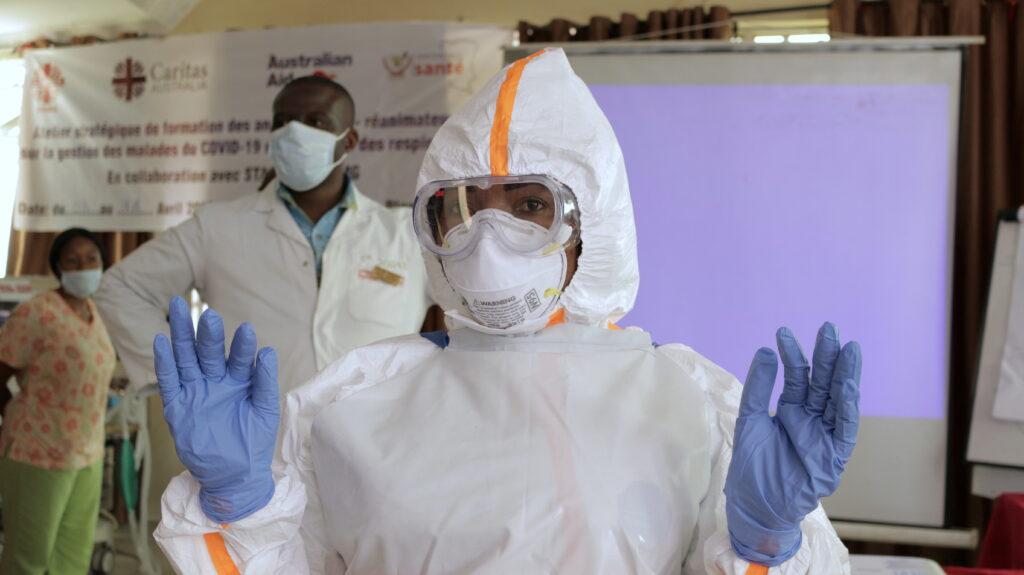
COVID-19 response teams DRC
The most important comparisons, as we maintain in this commentary, are those comparisons that citizens themselves do in order to assess the government’s response, make sense of the situation, and act accordingly. One of the crucial insights we gained from our recently conducted research project ‘Humanizing the design of the Ebola response in eastern DRC’ (August 2019–January 2020; funded by the R2HC Elhra programme) is the following: there is a tendency in social science research during humanitarian crises to adopt the perspectives and terminologies of public health interventions to assess citizens’ behaviours and perceptions, and how they might be corrected. This tendency blatantly ignores the fact that those targeted by the emergency response also evaluate and assess the rationality of public health measures. In this respect, mistrust is not only rooted in traditional beliefs or conspiracy theory but is also formed by citizens’ assessment of the rationality of the emergency response to the EVD epidemic. Taking these comparisons and assessments seriously is crucial for understanding to what extent people will adapt to the current Covid-19 pandemic.
Hence for this piece we draw on a series of interviews conducted for the radio station of the Pole Institute, ‘Pole FM radio’, in which we asked residents in the two Eastern Congolese cities Goma and Beni how they are preparing to protect themselves against Covid-19. The answers illuminate how the experience of living through the EVD epidemic shapes individuals’ and communities’ responses to Covid-19.
A young woman, for instance, who works as a receptionist in a local hotel told us:
‘With Coronavirus, I am much more alert than with Ebola. At my workplace, we have increased basic hygiene measures taken against Ebola fivefold. We learned that Corona is more virulent. So, the situation we have experienced with Ebola has allowed us to be much more careful and conscientious in the event of an epidemic.’
A similar comparison is provided by a vendor in Himbi district of Goma who told us that in retail outlets and pharmaceutical stores, disinfectant gels have become rare; everyone wants to get them to ensure their personal hygiene. As he explained:
‘When Ebola started, the sale of disinfectant products was very low, we hardly sold them. But when the epidemic worsened, we sold them more and more, but we had never reached the level of sale we are reaching now since the announcement of the Corona virus in Kinshasa. Our stocks are empty and we do not hesitate to replenish them again. This really proves that Ebola has helped us a lot to realise the importance of protecting ourselves by disinfecting our hands and our environment.’
As these two accounts suggest, for residents in Goma, Covid-19 poses a greater threat than EVD. In fact, in the case of Covid-19, citizens have not waited for funding from NGOs to raise awareness or take important preventative measures. Head teachers decided to close their schools even before the government officially declared that all public spaces should be closed down and most NGOs in Goma bought masks and distributed them to their staff a week before the state of emergency and the closure of the borders on March, 24. People are painfully aware that Covid-19 response measures, like hand washing, self-isolation, or social distancing presume a working infrastructure that ensures the availability of water, electricity, and, more importantly, food supplies. Hence, it is simply not possible to implement these measures to the same degree in the Democratic Republic of Congo as in Europe since access to basic services is still poor. The faster this pandemic and the restrictions are over, the better.
Most respondents agree that the transmission of Covid-19 will be far more difficult to control and contain than in the case of the EVD epidemic and that Covid-19 poses a greater risk of spreading quickly over the entire country. Indeed, at this very moment, the cases have a greater geographical span than was the case in the recent and past Ebola epidemics in the country. After the first Covid-19 cases in Kinshasa, six more cases were detected in Beni and in Goma, making the people aware of the highly dynamic spatial spread compared to the Ebola epidemic.
This raises an another important question, as Paul Richards has been pointing out for the case of Sierra Leone: to what extent can the capacities of resilience and innovation that emerged out of the creative adaptation to the Ebola epidemic in North Kivu and Ituri provinces inform the country-wide response to the Covid-19 pandemic?
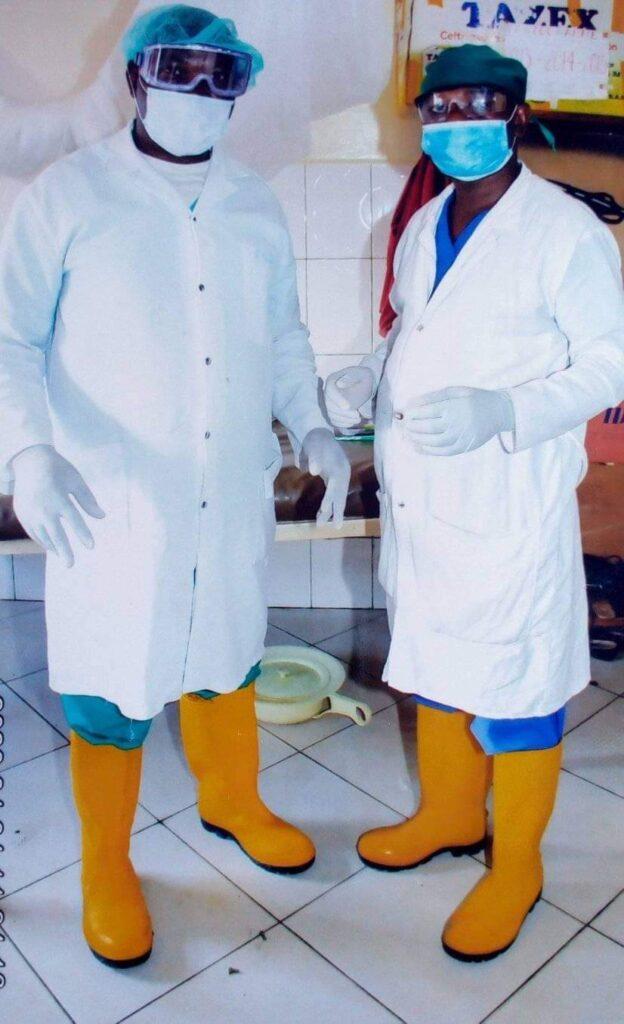
Ebola responders DRC
On the institutional level, the national government has rapidly put systems in place to control travellers and promote hand washing, especially at the border, in the airports, etc. Moreover, the laboratories established during the EVD epidemic are now used for testing of Covid-19. It is planned that Covid-19 screening will soon become possible in the laboratories of Goma and Lubumbashi. Such measures leave the impression that citizens and authorities know the mechanisms they learned from the Ebola epidemic. So far, people testing positive for Covid-19 are put under quarantine without any serious contestation from communities, unlike during the Ebola epidemic. Therefore, one of the most relevant experiences the country learned from the Ebola outbreak is the targeted quarantining of all categories of Covid-19 patients. Furthermore, there seems to be a fairly strong social, administrative, health, political and epidemiological memory that can allow the country to fight against Covid-19. In particular the leadership of the epidemiologist Professor Jean-Jacques Muyembe, who was in charge of the Ebola response and who is now in charge of Covid-19 measures, seems to contribute significantly to lessen the panic of citizens.
Nonetheless, and this is another central insight from our research on the EVD epidemic, it is also crucial to situate the above-mentioned comparisons between EVD and Covid-19. As our interlocutors told us during the research: ‘Chaque cas, chaque village a ses réalités’. Each case, family, or village has its own reality. Epidemics are contingent upon a multiplicity of factors, which at times confront the emergency response with unexpected challenges. It is crucial to note that the Ebola epidemic was concentrated in North Kivu province and Ituri province, which in everyday parlance is called the Greater North (‘le Grand Nord’). Goma, the capital of North Kivu province, had only one EVD case. More importantly it has been relatively stable compared to the epicentres of the EVD epidemic, where an ongoing war was palpably inhibiting the emergency response. The national capital, Kinshasa, is 1,700 kilometres and politically even further away from the epicentres of the Ebola epidemic.
Hence, asked if people in Beni would take the measures for Covid-19 seriously after having lived through the Ebola epidemic, a medical doctor, with whom we worked during the Ebola epidemic, told us that:
‘because the area has been affected by Ebola it has certain advantages over other unaffected areas. The population is used to check points and the majority of households have handwashing facilities, which they use correctly. At the entrance of public places, you can find hand washing devices and thermo flashes to take the temperature. This is a significant achievement for the people of Beni. So, the population is already prepared as far as these measures to limit contamination are concerned.’
Another research informant from the local association of taxi drivers told us that they had already held meetings to develop guidelines for all taxi drivers to implement the recommended protection measures.
‘Although this is a financial loss for us, we quickly became aware of the risk, and no longer want to experience the same drama. … We can say that the population of Beni will not mount resistance to Corona [protection measures], thanks to the strong sensitisations to which it was exposed during the epidemic of the Ebola Virus Disease. Discussions with these populations in Beni help to understand how Ebola experience has contributed to the production of knowledge on serious diseases and how it can spread in the community. With this new acquired knowledge, the population is much more proactive, and more able and willing than before to prevent, manage and avoid the disease.’
These accounts suggest that the Ebola epidemic has indeed raised awareness and probably also compliance. The last comment about not wanting to experience ‘the same drama’ again makes another crucial point. A comparison of EVD and Covid-19 has to consider that the history of the EVD epidemic in this region is also a history of unpreparedness shaped by a multiplicity of factors: cancelled elections, attacks by armed groups, deteriorated state–society relations and political marginalisation. In total, the EVD epidemic lasted for more than two years despite the availability of effective treatment and vaccines. After the first Ebola case was confirmed in August 2018 and the emergency response was rolled out, the relationship between those mounting the response and the communities deteriorated steadily fostering mistrust and even violent resistance. We regularly heard extreme comments like ‘Ebola does not exist, it is only an invention to make money from Western people’; ‘Ebola is business’, ‘we will not wash our hands and we will not die from it’; or ‘you who believe it, do it.’ These sentences had become slogans in the streets, public places and some debates. Mistrust and resistance reduced from August 2019 onwards after the emergency response started to learn to adapt to the communities too and started to take seriously people’s expectations of fair and decent treatment. For example, accommodating people’s expectations in the area of staff recruitment and payment was crucial to address the conviction that Ebola is nothing more than business. Creative adaptations like the decentralisation of care and treatment were also initiated to reduce mistrust (Shuchman 2019; Park et al. 2020). However, these adaptations came late and only after resistance and mistrust had become rampant.
In this regard we note a certain discord in the way in which information on Coronavirus is being disseminated by political and health authorities in the country, such that once again the population starts to doubt the information provided by these authorities. Moreover, in the face of inconsistencies in communication, which bring the whole response system into disrepute, a very large part of the population will search for other sources of information, with the risk of a high level of disinformation which in turn might exacerbate panic among the people. Preventing this panic requires trust, especially in those who have the responsibility of informing the population and responding to the crisis. So far it does not look bad in Congo, but everything depends on contingent events.
During the Ebola epidemic, both international and Congolese experts realised quite late that the dominant approach in biomedicine, the transfer of medical knowledge and instructions for action, was not sufficient to create trust. The three dynamics that made it difficult to control the Ebola outbreak in North Kivu are also crucial for the Covid-19 response: the undersupply of medicines for other diseases, the problematic practice of centralised and quarantine-oriented treatment centres that hindered social contact and thus the flow of communication, and the population’s long and existential experience of state neglect and violence. Addressing these problems means creating trust by taking both people’s assessment of the rationality of the emergency response and their multiple realities seriously.
References
Park, S.-J., Morisho, N., Muhindo, K.W., Anoko, J., Gobat, N., Brown, H. and Borchert, M., 2020, ‘What do adaptations tell us about the production of trust? Shifting the “burden of change” from people to the response’, Humanitarian Exchange: Special Feature Responding to Ebola in the Democratic Republic of Congo 22: 24–26.
Shuchman, M., 2019, ‘NGOs push for decentralised Ebola treatment in Dr Congo’, The Lancet 393: 2110–11.




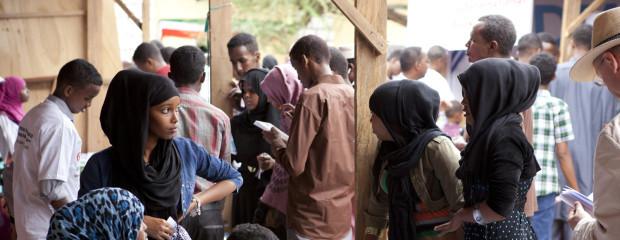


chlorodine https://chloroquineorigin.com/# hydroxichlorquine
cialis pills https://cialiswithdapoxetine.com/
https://cialiswithdapoxetine.com/ cialis generic